
Kishore Kumar was an Indian playback singer, musician and actor. He is widely regarded as one of the greatest, most influential and dynamic singers in the history of modern Indian music. Kumar was one of the most popular singers in the Indian subcontinent, notable for his yodelling and ability to sing songs in different voices. He used to sing in different genres but some of his rare compositions, considered classics, were lost in time.
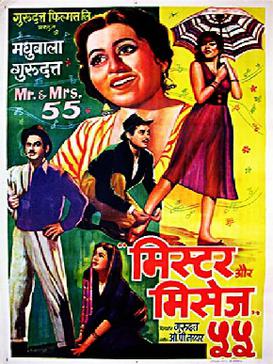
Mr. & Mrs. '55 is a 1955 Indian romantic comedy film directed and produced by Guru Dutt, from a screenplay written by Abrar Alvi. A socially critical film set in urban Mumbai, it stars Madhubala as Anita Verma, a naive heiress who is forced into a marriage with an unemployed cartoonist to save her millions.

Chalti Ka Naam Gaadi is a 1 January 1958 Indian musical comedy film directed by Satyen Bose. Starring Madhubala with the Ganguly brothers —Ashok Kumar, Anoop Kumar, and Kishore Kumar— the film revolves around a middle-aged man who resents women due to some misunderstandings and forbids his younger brothers from marrying.
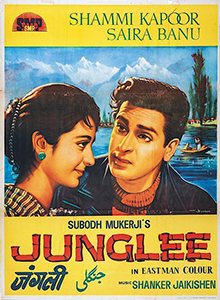
Junglee is a 1961 Indian comedy film produced and directed by Subodh Mukherjee. The music is composed by Shankar-Jaikishan and the lyrics by Shailendra and Hasrat Jaipuri. The film stars Shammi Kapoor, Saira Banu in lead roles, along with Shashikala, Anoop Kumar, Lalita Pawar in supporting roles. Saira Banu earned a Filmfare nomination as Best Actress.

The Ganguly family is an Indian show business family active in Hindi cinema (Bollywood). It originates from the Ganguly brothers: Ashok Kumar, Anoop Kumar and Kishore Kumar (née Ganguly).
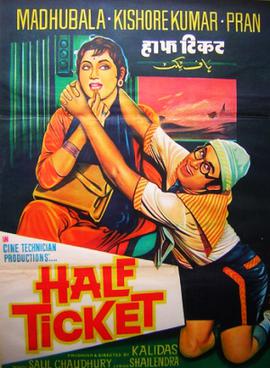
Half Ticket is a 1962 Indian Hindi-language comedy film directed by Kalidas and produced by Bombay Talkies. Starring Madhubala, Kishore Kumar and Pran, the film revolves around Vijay, a good-for-nothing young man who decides to leave his house when his father forces him to get married.
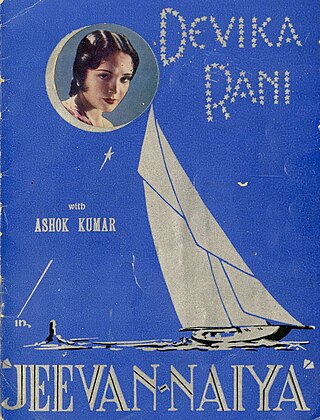
Jeevan Naiya is a 1936 Indian Hindi film directed by Franz Osten, and produced by Himanshu Rai for his studio Bombay Talkies. It is famous for being the screen debut of early superstar Ashok Kumar. The film is about the ostracism of dancing girls. The film was one of several successful Bombay Talkies collaborations between Franz Osten, Himashu Rai, screenwriters J. S. Kashyap and Niranjan Pal, and their leading lady of the time, Devika Rani.

Naya Zamana is a 1971 Indian Hindi-language film produced and directed by Pramod Chakrovorty. The film stars included Dharmendra, Hema Malini, Ashok Kumar, Mehmood, Pran, Lalita Pawar and Aruna Irani. The music is by S. D. Burman. It was written by Aghajani Kashmeri, who also wrote Love in Tokyo and Ziddi for Pramod Chakravorty. The movie is loosely based on the 1944 Bengali movie Udayer Pathey and 1945 Hindi film Hamrahi, directed by Bimal Roy.

Dream Girl is a 1977 Hindi film, directed by Pramod Chakravorty. The movie stars Hema Malini, Ashok Kumar, Dharmendra and Prem Chopra. According to film expert Rajesh Subramanian Hema Malini was promoted as the Dream Girl by producer B Ananthaswamy from her first film and that eventually led her to star in this film.
The following is a filmography for the Indian film actor, singer, lyricist, composer, producer, director, screenwriter and scriptwriter Kishore Kumar :
Hifazat is a 1973 Indian Hindi-language drama film directed by K. S. R. Das. The film stars Ashok Kumar, Vinod Mehra, Asha Sachdev, Narendra Nath and Lalita Pawar. The film was not a commercial success but songs are classics even today.

Do Phool is a 1974 Indian Hindi-language comedy film directed by S. Ramanathan. The film stars Ashok Kumar, Vinod Mehra and Mehmood. It is a remake of the Tamil-language film Anubavi Raja Anubavi.

Janta Havaldar is a 1979 Indian Hindi-language film directed by Mehmood, with Rajesh Khanna playing the title role, paired opposite Yogita Bali. The film has Ashok Kumar and Hema Malini making extended guest appearances. This film was not commercially successful at the time of its release. However over the years, the film has been appreciated by the audiences in its screening on television and has gained a cult following over the years. This movie has songs sung by a newcomer Anwar as Kishore Kumar refused to sing for the movie as it had his ex-wife Yogita Bali in the lead.

Dil Ka Kya Kasoor is a 1992 Indian Hindi-language musical melodrama film directed by Lawrence D'Souza. It stars Divya Bharti and debutant Prithvi with Sanam, Suresh Oberoi and Laxmikant Berde in supporting roles. The music of the film, from the duo Nadeem-Shravan, was an instant hit due to its catchy melodies.
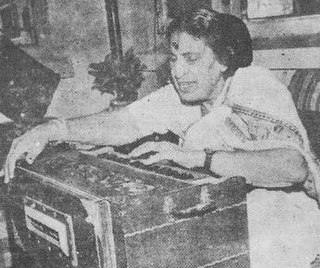
Saraswati Devi, born Khorshed Minocher-Homji, was an Indian director of music and score composer who worked in Hindi cinema in the 1930s and 1940s. She is most noted for her score, Mein Ban ki Chiriyra Banke Bun Bun Bolun Re in Bombay Talkies's Achut Kanya (1936). She along with Nargis' mother & Sanjay Dutt's grandmother Jaddanbai is considered to be one of the first female music composers in Indian cinema.

Baap Re Baap is a 1955 Hindi family comedy drama film, produced and directed by A. R. Kardar. Produced under the Kardar Productions banner, it had dialogues by S. N. Bannerjee and Jagdish Kanwal. The music of the film was composed by O. P. Nayyar, with the lyrics written by Jan Nisar Akhtar.
Khalifa is a 1976 Hindi film, produced by Jeetendra Luthra and directed by Prakash Mehra. The film stars Randhir Kapoor, Rekha, Pran, I. S. Johar, Madan Puri and Lalita Pawar.

Gateway of India is a 1957 Indian Hindi-language black comedy film directed and produced by Om Prakash and cinematographed by G. Singh. The film is edited by Dharamvir and music is composed by Madan Mohan. It features an ensemble cast including Bharat Bhushan, Pradeep Kumar, Madhubala, Anita Guha, Johnny Walker, Master Bhagwan.

Sharabi (transl. Drunkard) is a 1964 Hindi-language drama film directed by Raj Rishi and starring Madhubala and Dev Anand. The film tells the story of a man and his obsession with alcohol. Sharabi was a commercial success and one of the top-grossing films of 1964. For Madhubala, although the film released five years before her death, it was her final release in her lifetime.

Mehlon Ke Khwab is a 1960 Indian Hindi-language comedy film directed by Muhafiz Haider and starring Madhubala, Kishore Kumar and Pradeep Kumar.

















